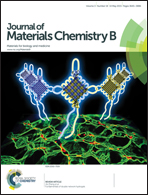Water-soluble hyaluronic acid–hybridized polyaniline nanoparticles for effectively targeted photothermal therapy†
Abstract
The construction of advanced phototherapy systems with high therapeutic efficacy toward cancer and low side effects, especially targeted species, is highly desirable. Herein, we developed one kind of water-soluble hyaluronic acid–hybridized polyaniline nanoparticles (HA–PANI NPs) as a nanoplatform for photothermal therapy (PTT) with targeted specificity of a CD44-mediated cancer cell. The water-soluble HA–PANI NPs were fabricated by one-step oxidative polymerization using aniline as a polymerizable monomer and HA as a stabilizer and targeted agent, where non-covalent electrostatic interaction between the negatively charged polymer HA and the cationic polymer PANI drives the formation of HA–PANI NPs. It was demonstrated that approximately spherical HA–PANI NPs are well-dispersed in aqueous solutions, with average hydrodynamic diameters of around 100 nm. Besides, HA–PANI NPs have negligible cytotoxicity in vitro, which facilitates biomedical applications with low toxicity. We studied the in vitro photothermal cell-killing efficacy of HA–PANI NPs by MTT assay and confocal microscopy measurement. The results reveal that HA–PANI NPs can selectively kill the cancer cells of HeLa and HCT-116 cells rather than normal cells of HFF cells upon exposure to a NIR 808 nm laser. The efficient intracellular intake of the HA–PANI NPs by both HeLa and HCT-116 cells are observed, confirming their targeting ability for CD44-overexpressing cancer cells. Furthermore, the results of in vivo photothermal ablation of tumors show excellent treatment efficacy, indicating that the HA–PANI NPs can be considered as an extremely promising nanoplatform for targeted PTT of cancer.


 Please wait while we load your content...
Please wait while we load your content...